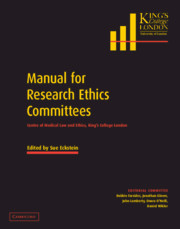Book contents
- Frontmatter
- Contents
- Editorial board
- Acknowledgements
- List of contributors
- Introduction
- Part I
- 1 The ethics of clinical research
- 2 Research ethics committees and the law
- 3 The regulation of medical research: a historical overview
- 4 The regulation of medical research in the UK
- 5 Observational and epidemiological research
- 6 Social survey research
- 7 Approaching qualitative research
- 8 Complementary and alternative medicine: challenges for research ethics committees
- 9 The ethical review of student research in the context of the governance arrangements for research ethics committees
- 10 The ethics of genetic research
- 11 Research or audit?
- 12 Randomised controlled trials
- 13 Determining the study size
- 14 Risk assessment for research participants
- 15 Absorbed radiation in patient and volunteer studies submitted to the ethical committee: a memorandum
- 16 A guide to the use of radioactive materials and radiological procedures for research purposes
- 17 Indemnity in medical research
- 18 The prevention and management of fraud and misconduct: the role of the LREC
- 19 Understanding clinical trials: a model for providing information to potential participants
- 20 The law relating to consent
- 21 Writing information for potential research participants
- 22 The law relating to confidentiality
- 23 Research involving vulnerable participants: some ethical issues
- 24 The ethics of research related to healthcare in developing countries
- Part II
- Index
1 - The ethics of clinical research
Published online by Cambridge University Press: 08 January 2010
- Frontmatter
- Contents
- Editorial board
- Acknowledgements
- List of contributors
- Introduction
- Part I
- 1 The ethics of clinical research
- 2 Research ethics committees and the law
- 3 The regulation of medical research: a historical overview
- 4 The regulation of medical research in the UK
- 5 Observational and epidemiological research
- 6 Social survey research
- 7 Approaching qualitative research
- 8 Complementary and alternative medicine: challenges for research ethics committees
- 9 The ethical review of student research in the context of the governance arrangements for research ethics committees
- 10 The ethics of genetic research
- 11 Research or audit?
- 12 Randomised controlled trials
- 13 Determining the study size
- 14 Risk assessment for research participants
- 15 Absorbed radiation in patient and volunteer studies submitted to the ethical committee: a memorandum
- 16 A guide to the use of radioactive materials and radiological procedures for research purposes
- 17 Indemnity in medical research
- 18 The prevention and management of fraud and misconduct: the role of the LREC
- 19 Understanding clinical trials: a model for providing information to potential participants
- 20 The law relating to consent
- 21 Writing information for potential research participants
- 22 The law relating to confidentiality
- 23 Research involving vulnerable participants: some ethical issues
- 24 The ethics of research related to healthcare in developing countries
- Part II
- Index
Summary
History is unfortunately peppered with stories of abuse carried out in the context of medical research. No one can remain unaware of the dreadful medical atrocities of the Nazi period, some of which were carried out by doctors motivated as much by scientific curiosity as by Nazi ideology. In the late 1990s, the US President, Bill Clinton, offered an apology to the families of those men involved in the infamous Tuskegee project, and in the opening years of the new millennium there has been international concern over the conduct of clinical trials in the developing world. In an attempt to protect individuals from abuse, international and national guidelines now govern this area of science, and in the United Kingdom research is carefully monitored through the work of funding bodies, peer review systems, Local Research Ethics Committees (LRECs) and Multi-Centre Research Ethics Committees (MRECs). However, at ground level, the moral responsibilities primarily lie with those who design and carry out the research, and then publicise the findings. It is therefore crucially important that these individuals understand the ethical issues that arise when human beings come under the scientific gaze.
The benefits of good medical research speak for them selves. In our own lifetime, killer diseases have been eradicated, death sentences have been lifted from a number of diseases, and incredible advances have been made in such areas as reproductive technology and transplant surgery. However, there are still important battles to be won, and discoveries we yearn to make. If research is to continue to bring about the benefits we hope for, we have to accept that there will be costs involved.
- Type
- Chapter
- Information
- Manual for Research Ethics CommitteesCentre of Medical Law and Ethics, King's College London, pp. 3 - 14Publisher: Cambridge University PressPrint publication year: 2003



